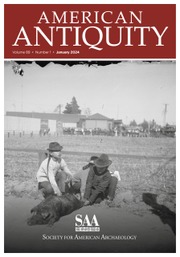Crossref Citations
This article has been cited by the following publications. This list is generated based on data provided by
Crossref.
Rodning, Christopher B.
2011.
Mortuary practices, gender ideology, and the Cherokee town at the Coweeta Creek site.
Journal of Anthropological Archaeology,
Vol. 30,
Issue. 2,
p.
145.
Arkush, Elizabeth
2011.
Explaining the Past in 2010.
American Anthropologist,
Vol. 113,
Issue. 2,
p.
200.
Schortman, Edward
and
Urban, Patricia
2011.
Power, Memory, and Prehistory: Constructing and Erasing Political Landscapes in the Naco Valley, Northwestern Honduras.
American Anthropologist,
Vol. 113,
Issue. 1,
p.
5.
Barrier, Casey R.
2011.
Storage and relative surplus at the Mississippian site of Moundville.
Journal of Anthropological Archaeology,
Vol. 30,
Issue. 2,
p.
206.
Shuler, Kristrina A.
Hodge, Shannon C.
Danforth, Marie Elaine
Lynn Funkhouser, J.
Stantis, Christina
Cook, Danielle N.
and
Zeng, Peng
2012.
In the shadow of Moundville: A bioarchaeological view of the transition to agriculture in the central Tombigbee valley of Alabama and Mississippi.
Journal of Anthropological Archaeology,
Vol. 31,
Issue. 4,
p.
586.
Roth, Barbara J.
and
Baustian, Kathryn M.
2015.
Kin Groups and Social Power at the Harris Site, Southwestern New Mexico.
American Antiquity,
Vol. 80,
Issue. 3,
p.
451.
Schneider, Tsim D.
2015.
Placing Refuge and the Archaeology of Indigenous Hinterlands in Colonial California.
American Antiquity,
Vol. 80,
Issue. 4,
p.
695.
Panich, Lee M.
2015.
“Sometimes They Bury the Deceased’s Clothes and Trinkets”: Indigenous Mortuary Practices at Mission Santa Clara de Asís.
Historical Archaeology,
Vol. 49,
Issue. 4,
p.
110.
Overholtzer, Lisa
and
Bolnick, Deborah A.
2017.
The Archaeology of Commoner Social Memories and Legitimizing Histories.
Journal of Archaeological Method and Theory,
Vol. 24,
Issue. 1,
p.
50.
Mixter, David W.
and
Henry, Edward R.
2017.
Introduction to Webs of Memory, Frames of Power: Collective Remembering in the Archaeological Record.
Journal of Archaeological Method and Theory,
Vol. 24,
Issue. 1,
p.
1.
Henry, Edward R.
2017.
Building Bundles, Building Memories: Processes of Remembering in Adena-Hopewell Societies of Eastern North America.
Journal of Archaeological Method and Theory,
Vol. 24,
Issue. 1,
p.
188.
McNutt, Ryan K.
2017.
‘What’s left of the flag’: the Confederate and Jacobite ‘lost cause’ myths, and the construction of mythic identities through conflict commemoration.
Journal of Conflict Archaeology,
Vol. 12,
Issue. 3,
p.
142.
Barrier, Casey R.
2017.
Town aggregation and abandonment during the era of urban transformations in the Cahokia region: Bayesian modeling of the Washausen mound-town.
Journal of Archaeological Science: Reports,
Vol. 11,
Issue. ,
p.
523.
Wood, M. Jared
and
Pluckhahn, Thomas J.
2018.
Terra incognita: terrestrial LiDAR documentation of Mound A at Kolomoki (9ER1).
Southeastern Archaeology,
Vol. 37,
Issue. 2,
p.
95.
Van Dyke, Ruth M.
2019.
Archaeology and Social Memory.
Annual Review of Anthropology,
Vol. 48,
Issue. 1,
p.
207.
Friberg, Christina M.
Wilson, Gregory D.
Bardolph, Dana N.
Wilson, Jeremy J.
Flood, John S.
Hipskind, Scott D.
Pike, Matthew D.
and
Esarey, Duane
2021.
The geophysics of community, place, and identity in the Mississippian Illinois River Valley.
Journal of Archaeological Science: Reports,
Vol. 36,
Issue. ,
p.
102888.
Baires, Sarah E.
2022.
Cahokia and the North American Worlds.
Cobb, Charles R.
2022.
Landscapes of forgetting and structural silence in the American Southeast.
American Anthropologist,
Vol. 124,
Issue. 1,
p.
90.
Recalde, Andrea
and
Colqui, Erica
2022.
Rock Art and Memory in the Transmission of Cultural Knowledge.
p.
171.
Gürçal, Erkan
and
Takaoğlu, Turan
2024.
Kalkolitik Gülpınar Sosyal Yapısında Süreklilik ve Değişim.
Arkeoloji Dergisi,
Vol. 1,
Issue. 32,
p.
17.


